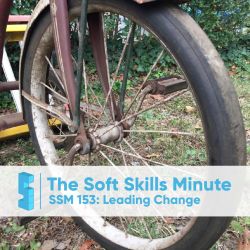Share

Serious Soft Skills
Podcast 16: Soft Skills: The True Differentiator for Employees, Job Seekers and Organizations
•
Soft skills are the true differentiator that helps people with strong technical skills earn jobs and transform their organizations, the hosts explain while answering listener questions.
Introduction
Bob Graham (‘0:20'): Welcome to Serious Soft Skills, Episode 16. With me is Dr. Tobin Porterfield. For you newcomers and those of you who have been with us for a while, you may or may not know we have uncovered a list of 55 soft skills. We dug this list up though academic research and our teaching of college students and work in various industries. Paying really close attention to these soft skills we are now doing this podcast to discover what each of these soft skills means and how they fit into our lives. Today we are going to extend that into a new direction and take some listener questions. It's always exciting. We're picked some really hard ones. Hopefully, we can find our way through them.
Soft Skills Are Not Teachable
Graham (‘1:16'): The first one comes from Anonymous, and you are going to see why in a second. Anonymous says, “Why do you guys care so much about soft skills? We either have them or don't so why are you spending so much time on them?”
Dr. Tobin Porterfield (‘1:46”): I like to question things. I have a skeptical mind. I want to ask if this is real. The argument that sets it up most. We kind of tee this up in the beginning of our book. The business environment has really changed. The business world is hyper competitive. Things are changing quickly. Technology change is coming on. The workplace has changed. The type of work we do has changed. It has made soft skills more important. It's not that they haven't existed. There are ones of us that have stronger sets of soft skills, stronger in some areas. But it's something that we need to bring to the workplace these days. A recognition of what they are is critical, as is a solid, honest self-reflection of where we each are on those soft skills is essential to the success of organizations. We have to say soft skills are there in the workplace, and if an individual has been able to avoid developing soft skills for a long time, that avoidance time is passed.
If we are going to be effective in the workplace today, soft skills are not optional.
Graham (‘3:02'): I would agree with all of that. I would add that you and I have countless examples of students we have taught who performed better when looking for a job and get the job because they have more soft skills. They are more in demand. We know that from research, and not just our research. Employers are looking for soft skills like problem-solving, written and oral communication. When they see people that can offer those skills, those are the people who are getting hired. I tell my students all the time that there are thousands of people just like you with that same engineering or writing degree, or whatever degree. How do you differentiate yourself?
You all know the same technical expertise. It's the soft skills, how you are going to apply them, how you are going to interact with people, that ultimately separates some from the pack.
Porterfield (‘3:57'): You said it and that is how we position soft skills. They are not in place of technical skills. It's how we implement and integrate those technical skills in the workplace. The people and the organizations that have valued and strengthened soft skills are better performers. They are able to take the same engineering skills, which we can hire into any organization if we have the money to hire people, but whether we are actually able to innovate, solve problems or transform an organization using those soft skills, that's where the soft skills are going to come in and make a huge difference. Soft skills are the differentiator between who gets the job an...
More episodes
View all episodes

SSM 158: Details, details, details
02:05Tobin Porterfield discusses the soft skill of paying attention to details.
75 Coaching With Neal Woodson Part 1
15:45Bob Graham interviews author, trainer, and expert coach Neal Woodson Part 1
SSM 157: Defaulting
03:11Bob discusses the power of defaulting to YES rather than immediately saying NO
SSM 156: Pivoting
03:02Bob Graham discusses how that you need to know when to alter you agenda. Even what works for years may need to change for long term success.


SSM 153: Leading Change
03:08If you are ready for a change - you might have to lead it - on today's podcast
